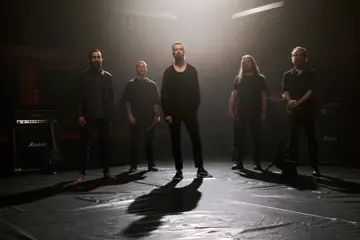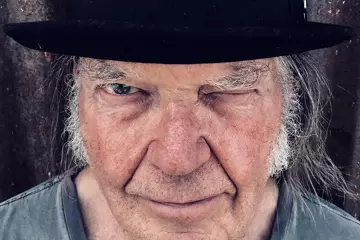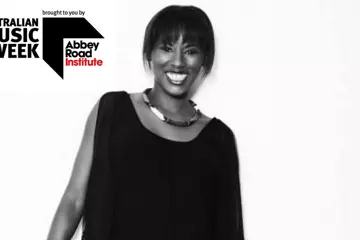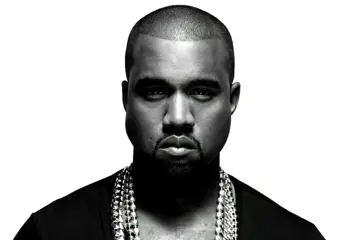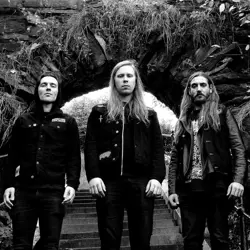 Dawn Ray’d
Dawn Ray’dAs a black metal fan, I wish more bands would be as open about their politics as Dawn Ray’d. For reasons that should be obvious, I don’t wish to contribute to even the pittance made via Spotify to bands that fraternize with Nazis, and black metal has no shortage of those. I propose a theory I’m calling “Famine’s Law”; the closer to Russia a black metal band gets, the higher the likelihood of that band containing at least one Nazi. I’ve named it after the frontman of Peste Noire, given that as his music has become more openly nationalistic, he’s all but relocated to Ukraine. He’s finally where he belongs, playing Asgardsrei festival with other scumbags.
Yet many bands hide their associations or politics or make excuses for them. I’ve recently stopped listening to Mgla due to their close ties with Mikko Aspa, a Nazi from Finland who makes openly racist music as the artist, Clandestine Blaze. Commenting on the controversy, Mgla did the typical song-and-dance about “not being a political band”, but when you’re literally playing the backing track to your friend’s anti-Semitic screeds, claims at being apolitical go out the window. At least I can always listen to Uada instead.
At least if bands were as open as Dawn Ray’d right off the bat, I wouldn’t have to get invested in them before deciding not to give them my streaming dollars - or fractions of a cent, as it were. From just glancing at the lyrics on the U.K. trio's new album, ‘Behold Sedition Plainsong’, you get the idea of where their politics lie, as they’re typically as subtle as a sledgehammer to the face. I’ll focus on three of their songs in particular: the album’s lead single, ‘To All, To All, To All!’; ‘A Time For Courage at the Borderlands’; and ‘Songs in the Key of Compromise’.

The first song is the least pointed of the three, and functions as a criticism of the utterly miserable grind that capitalism demands of people to grow the profits of the overlords CEOs. “Did I waste enough of the Summer, On tillage and hoarding? Did I worry enough, To worry again? Is this every year?” These lyrics tackle full-time work and the full-time stress that can follow it, as your actual life passes you by. It reminds me of the age-old rhetorical question ‘Do you live to work, or work to live?’ But the people asking the question nowadays don’t pose a solution, they simply imply that you should individually choose to work less, as if it’s that easy or simple for everybody. I’m particularly fond of the line “Is this every year?” It’s the unspoken motto of every soul who, while getting ready to go to work, thinks to themselves “Do I really have to do this shit for my entire life?” Let’s hope not.
Don't miss a beat with our FREE daily newsletter
The second song, ‘A Time for Courage at the Borderlands’, is exactly what you think it’s about; the treatment of immigrants and refugees. “Stay and watch your children die, Or run and they might survive / Evade the pigs at the border, Unflinchingly ruining people’s lives”. I told you it was obvious. Less of a call for governmental policy, the band’s anarchist leanings stand out, as they call for ordinary people to stand up and be willing to fight, to sacrifice time and resources for people who have been through absolute hell and deserve support: “What if what was needed, Was another pair of hands / Active solidarity, The skills that you have?” Given that the current debate around refugees is whether or not to refer to their prisons as “concentration camps”, Dawn Ray’d advocate for direct action that undermines the realm of government entirely.
‘Songs in the Key of Compromise’ is interesting, as the song basically reiterates my opening complaints about the politics of many black metal acts. The song directly calls out Anti-Christian black metal bands for opposing religious doctrines while refusing to take a stand on other forms of oppression. Or even worse, as is the case with someone like Varg Vikernes, full-throatedly supporting forms of oppression based on ludicrous race science. The lyrics call these bands “A truly meagre blasphemy”, and says these bands share space with Christianity as they are “Two sides of a worthless coin”. It all reminds me of a tweet that made the rounds recently, saying “Trve Kvlt Black Metal is about sticking it to the church by having the same views about race, gender, sexuality, immigration, and culture as the average Evangelical Christian”. The song’s premise is particularly timely, given the recent furor surrounding Nergal from Behemoth declaring that he is “Anti Antifa”. Huh, if only there was a less clumsy word for that.
So that’s a general summary of the album’s lyrics and themes; in-your-face, topical, and about as left-wing as you can damn well get. I can certainly dig it. So what does the album’s instrumentals have in store? Well, they certainly don’t reinvent the wheel, I’ll say that much.
Besides the nice inclusion of violins, the music is mostly reminiscent of old-school black metal, like early Darkthrone or Peste Noire. The riffs are simplistic but very effective, harkening back to the days when black metal guitarists were all 16-years-old and could barely play their instruments. The song lengths follow the same principle, almost all hovering around three to four minutes, offering little room to breathe. If you’re looking for five-minute-long intros, you’ve come to the wrong place. Listening to old albums, like Darkthrone’s 'Under A Funeral Moon,' there was an anarchic, punk-like urgency to them, and Dawn Ray’d have emulated that extremely well, with their unrelenting pace and bitingly raw production. Even the albums cover seems to evoke a bygone era of black metal, showing a photo of a castle with a somewhat goofy font. All it needs is to be in black-and-white and it could fit in with 90’s Satyricon.
I have a theory about this, but I have theories about a lot of things, so take this with a grain of salt. By deliberately emulating black metal’s history, which I believe Dawn Ray’d to be doing, they’re appropriating a cherished possession of the far-right - fucking cool old-school black metal - and using it for radical left-wing purposes. The riffs similarity to those of early Peste Noire, while obviously being a result of them being relatively simple to play, take an art form rife with Nazis and turn it on its head. Think about the castle photo as this album's artwork. Castles themselves are a symbol of classical “Western Culture”, that nebulous phrase trotted out by weird, idiotic online mouth-pieces and those adjacent to amalgamate Norse, Roman, and Greek culture. Yet Dawn Ray’d explicitly using said imagery to promote their own anarchist politics seems to be saying to the far-right: “You don’t just get to own this shit”.
This brings me to the violin, the inclusion of which I believe is doing a similar thing. (That, or the band just added it because it sounded cool and melodically contrasted all of their noisy, heavy instrumentals. Either way, their implementation on this record is really well done.) Violins are certainly an interesting choice for an anarchist band, given their upper-class status. Violins are associated with Europe’s rich history and are usually associated with more classical music composers. These composers, and the violin itself, are more examples of so-called “Western Culture”. At the same time, knowing how to play the violin carries an immense amount of cultural capital. I just can imagine their vocalist telling people he plays the violin, only to reveal he’s the frontman of a black metal band and not a violinist for the Thatcherite Bourgeois Philharmonic Orchestra.
Appropriating unclaimed symbolism is a thing that the left needs to do more, in my honest opinion. As the capital cities of Chile and Lebanon are currently on fire, some protesters have been leading marches donning Joker costumes and face paint. The Joker is hardly a leftist icon, but if the right can take Norse runes, we can take edgelord comic book villains. The right has been a dominant presence in black metal for some time, as Dawn Ray’d mention on this very album, and a strong leftist movement, deliberately reclaiming and using similar imagery and symbolism, is a powerful way to regain some territory.
Dawn Ray’d certainly aren’t massive innovators in the field of black metal music. If anything, their form of innovation is sounding more like early Darkthrone than Wolves in the Throne Room ever could. But the raw, serrated music here serves as an energetic, powerful vehicle for the band’s important political lyrics, ranging in topic from calling out black metal centrists larping as liberators, to fighting for the rights of refugees, and so much more. When one of the biggest figures in black metal today calls himself “Anti Antifa”, a band of driven, young unabashed leftists occupying the same space is exactly what we need right now. It's caustic, aggressive black metal with something genuine and revolutionary to share, and I fully support that.
1. Raise The Flails
2. The Smell Of Ancient Dust
3. Like Smoke Into Fog
4. To All, To All, To All!
5. A Time For Courage At The Borderlands
6. Songs In The Key Of Compromise
7. Until The Forge Goes Cold
8. A Stone's Throw
9. Soon Will Be The Age Of Lessons Learnt
10. Salvation Rite
11. The Curse, The Dappled Light
'Behold Sedition Plainsong' is out now:



